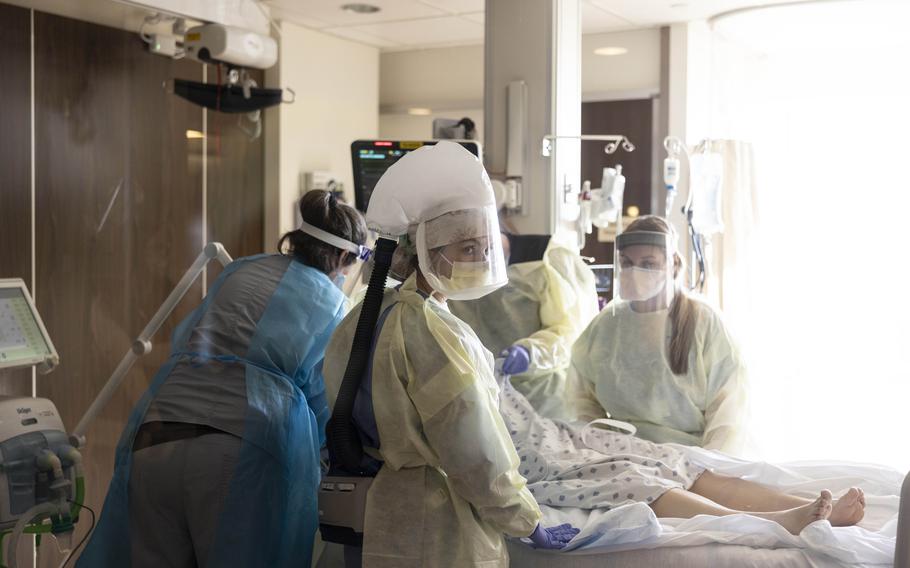Coronavirus
Global COVID-19 death toll surpasses 6 million, another grim milestone in the pandemic
The Washington Post March 7, 2022

A team of nurses and physicians transfers a patient with COVID-19 into the intensive care unit at St. Cloud Hospital in Minnesota in November 2021. (Jenn Ackerman/for The Washington Post)
Stars and Stripes is making stories on the coronavirus pandemic available free of charge. See more stories here. Sign up for our daily coronavirus newsletter here. Please support our journalism with a subscription.
Worldwide deaths from COVID-19 surpassed 6 million on Monday, a grim reminder of the coronavirus’s lethality as many countries relax masking or vaccination requirements.
Even as vaccination rates rose in parts of the world, the daily average of COVID deaths stood at 9,000 during the last 28 days, according to data from Johns Hopkins University.
About 4% of all COVID deaths worldwide were recorded in the last month. Experts say that the 6 million total — the first deaths from the virus were reported in early 2020 — is most likely an undercount and that the public should remain on guard.
“Americans need to understand the sooner we get the world vaccinated, the better it will be,” said Carlos del Rio, global health professor at Emory University’s Rollins School of Public Health. “We are still seeing over 1,000 deaths a day in the U.S. That’s an unacceptably high number.”
Multiple scientific studies have shown that the unvaccinated are more likely to suffer worse health outcomes from COVID-19 — including harsher symptoms, hospitalization and death — than people who receive the shot.
Data from the Centers for Disease Control and Prevention show that 76.5% of the U.S. population had received at least one dose of a coronavirus vaccine, and 65% had received a full course of the vaccine, as of Sunday.
The segment of the U.S. population that has declined the vaccine has been largely unshakable, according to surveys from the nonpartisan Kaiser Family Foundation.
Liz Hamel, Kaiser Family Foundation director of public opinion and polling research, said “hardcore refusers” consistently make up 12% to 16% of people in polls since the foundation began monitoring vaccine attitudes.
“While we see a decrease in the share that say they’re on the fence — the ‘wait and see’ category — and while we’ve seen a slight decrease in the people who say they’ll get it if required, that group of hardcore refusers has been very consistent since the beginning,” Hamel said, and it is “mainly a group that identified as Republicans.”
“Being a Republican has become an even stronger predictor of being unvaccinated over time,” she said.
Aditi Nerurkar, a Harvard Medical School physician and lecturer on global health, said the new global death total showed that the United States cannot declare victory against the pandemic while the virus continues to spread across an under-vaccinated globe, noting that new outbreaks are flaring up in Hong Kong and the Pacific islands.
On Feb. 25, the CDC issued new guidance for state and local officials and the public, recommending that masks be worn in public only in counties with relatively high case counts and overburdened hospitals. Almost all states had relaxed their indoor masking requirements by the time the guidance was released.
Nearly 960,000 people in the United States have died from COVID, representing almost 1 of every 6 COVID deaths globally.
No matter where it happens on the map, the more the virus spreads, the more likely new variants are to emerge, Nerurkar said. The omicron variant was first detected in southern Africa late last year and quickly spread to other continents, leading to a resurgent wave of the pandemic.
Coronavirus indicators already were relatively high in Eastern Europe before Russia invaded Ukraine. Nerurkar said global conflicts historically have accelerated the spread of infectious diseases. Researchers say the 1918-1919 flu pandemic was worsened by global movements during World War I.
“If you start relaxing masking, removing vaccine passport requirements, that translates to people’s daily lives, and they start believing the pandemic is over because all of these changes are happening,” Nerurkar said. “And that’s such a stark difference from what’s really happening.”